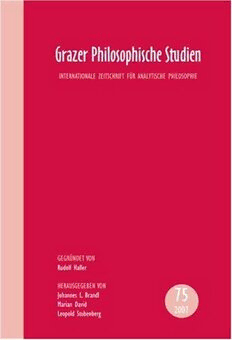Download Essays on Frege's Conception of Truth. (Grazer Philosophische Studien 75) (Grazer Philosophische Studien) PDF Free - Full Version
Download Essays on Frege's Conception of Truth. (Grazer Philosophische Studien 75) (Grazer Philosophische Studien) by Dirk Greimann in PDF format completely FREE. No registration required, no payment needed. Get instant access to this valuable resource on PDFdrive.to!
About Essays on Frege's Conception of Truth. (Grazer Philosophische Studien 75) (Grazer Philosophische Studien)
In his writings on the foundations of logic, Gottlob Frege, the father of modern logic, sketched a conception of truth that focuses on the following questions: What is the sense of the word "true"? Is truth a definable concept or a primitive one? What are the kinds of things of which truth is predicated? What is the role of the concept of truth in judgment, assertion and recognition? What is the logical category of truth? What is the significance of the concept of truth for science in general and for logic in particular? The present volume is dedicated to the interpretation, reconstruction and critical assessment of Frege's conception of truth. It is of interest to all those working on Frege, the history of logic and semantics, or theories of truth. The volume brings together nine original papers whose authors are all widely known to Frege scholars. The main topics are: the role of the concept of truth in Frege's system, the nature of the truth-values, the logical category of truth, the relationship between truth and judgment, and the conception of the truth-bearers. Table of Contents** Introduction** Part I. Truth in Frege's Formal System** Hans SLUGA: Truth and the Imperfection of Language** Richard G. HECK, Jr.: Frege and Semantics** Danielle MACBETH: Striving for Truth in the Practice of Mathematics: Kant and Frege** Part II. Truth and the Truth-Values** Michael BEANEY: Frege's Use of Function-Argument Analysis and his Introduction of Truth-Values as Objects** Dirk GREIMANN: Did Frege Really Consider Truth as an Object?** Part III. Truth and Judgment** Erich H. RECK: Frege on Truth, Judgment, and Objectivity** Verena MAYER: Evidence, Judgment and Truth** Part IV. The Nature of the Truth-Bearers** Oswaldo CHATEAUBRIAND: The Truth of Thoughts: Variations on Fregean Themes ** Marco RUFFINO: Fregean Propositions, Belief Preservation and Cognitive Value**
Detailed Information
| Author: | Dirk Greimann |
|---|---|
| Publication Year: | 2007 |
| ISBN: | 9781435612563 |
| Pages: | 257 |
| Language: | English |
| File Size: | 1.025 |
| Format: | |
| Price: | FREE |
Safe & Secure Download - No registration required
Why Choose PDFdrive for Your Free Essays on Frege's Conception of Truth. (Grazer Philosophische Studien 75) (Grazer Philosophische Studien) Download?
- 100% Free: No hidden fees or subscriptions required for one book every day.
- No Registration: Immediate access is available without creating accounts for one book every day.
- Safe and Secure: Clean downloads without malware or viruses
- Multiple Formats: PDF, MOBI, Mpub,... optimized for all devices
- Educational Resource: Supporting knowledge sharing and learning
Frequently Asked Questions
Is it really free to download Essays on Frege's Conception of Truth. (Grazer Philosophische Studien 75) (Grazer Philosophische Studien) PDF?
Yes, on https://PDFdrive.to you can download Essays on Frege's Conception of Truth. (Grazer Philosophische Studien 75) (Grazer Philosophische Studien) by Dirk Greimann completely free. We don't require any payment, subscription, or registration to access this PDF file. For 3 books every day.
How can I read Essays on Frege's Conception of Truth. (Grazer Philosophische Studien 75) (Grazer Philosophische Studien) on my mobile device?
After downloading Essays on Frege's Conception of Truth. (Grazer Philosophische Studien 75) (Grazer Philosophische Studien) PDF, you can open it with any PDF reader app on your phone or tablet. We recommend using Adobe Acrobat Reader, Apple Books, or Google Play Books for the best reading experience.
Is this the full version of Essays on Frege's Conception of Truth. (Grazer Philosophische Studien 75) (Grazer Philosophische Studien)?
Yes, this is the complete PDF version of Essays on Frege's Conception of Truth. (Grazer Philosophische Studien 75) (Grazer Philosophische Studien) by Dirk Greimann. You will be able to read the entire content as in the printed version without missing any pages.
Is it legal to download Essays on Frege's Conception of Truth. (Grazer Philosophische Studien 75) (Grazer Philosophische Studien) PDF for free?
https://PDFdrive.to provides links to free educational resources available online. We do not store any files on our servers. Please be aware of copyright laws in your country before downloading.
The materials shared are intended for research, educational, and personal use in accordance with fair use principles.

